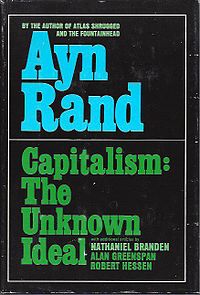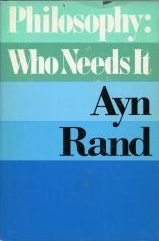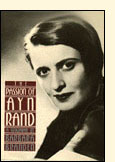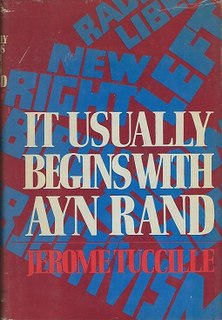
Alice O'Connor, better known by her pen name Ayn Rand, was a Russian-born American writer and philosopher. She is known for her fiction and for developing a philosophical system she named Objectivism. Born and educated in Russia, she moved to the United States in 1926. After two early novels that were initially unsuccessful and two Broadway plays, she achieved fame with her 1943 novel, The Fountainhead. In 1957, Rand published her best-known work, the novel Atlas Shrugged. Afterward, until her death in 1982, she turned to non-fiction to promote her philosophy, publishing her own periodicals and releasing several collections of essays.

The Fountainhead is a 1943 novel by Russian-American author Ayn Rand, her first major literary success. The novel's protagonist, Howard Roark, is an intransigent young architect, who battles against conventional standards and refuses to compromise with an architectural establishment unwilling to accept innovation. Roark embodies what Rand believed to be the ideal man, and his struggle reflects Rand's belief that individualism is superior to collectivism.

Anthem is a dystopian fiction novella by Russian-American writer Ayn Rand, written in 1937 and first published in 1938 in the United Kingdom. The story takes place at an unspecified future date when mankind has entered another Dark Age. Technological advancement is now carefully planned and the concept of individuality has been eliminated. A young man known as Equality 7-2521 rebels by doing secret scientific research. When his activity is discovered, he flees into the wilderness with the girl he loves. Together they plan to establish a new society based on rediscovered individualism.

We the Living is the debut novel of the Russian American novelist Ayn Rand. It is a story of life in post-revolutionary Russia and was Rand's first statement against communism. Rand observes in the foreword that We the Living was the closest she would ever come to writing an autobiography. Rand finished writing the novel in 1934, but it was rejected by several publishers before being released by Macmillan Publishing in 1936. It has since sold more than three million copies.

This is a bibliography for Ayn Rand and Objectivism. Objectivism is a philosophical system initially developed in the 20th century by Rand.

The Early Ayn Rand: A Selection from Her Unpublished Fiction is an anthology of unpublished early fiction written by the philosopher Ayn Rand, first published in 1984, two years after her death. The selections include short stories, plays, and excerpts of material cut from her novels We the Living and The Fountainhead.

Objectivism: The Philosophy of Ayn Rand is a 1991 book by the philosopher Leonard Peikoff, in which the author discusses the ideas of his mentor, Ayn Rand. Peikoff describes it as "the first comprehensive statement" of Rand's philosophy, Objectivism. The book is based on a series of lecture courses that Peikoff first gave in 1976 and that Rand publicly endorsed. Peikoff states that only Rand was qualified to write the definitive statement of her philosophic system, and that the book should be seen as an interpretation "by her best student and chosen heir." The book is volume six of the "Ayn Rand Library" series edited by Peikoff.

The Romantic Manifesto: A Philosophy of Literature is a collection of essays regarding the nature of art by the philosopher Ayn Rand. It was first published in 1969, with a second, revised edition published in 1975. Most of the essays are reprinted from Rand's magazine The Objectivist.

The Objectivist movement is a movement of individuals who seek to study and advance Objectivism, the philosophy expounded by novelist-philosopher Ayn Rand. The movement began informally in the 1950s and consisted of students who were brought together by their mutual interest in Rand's novel, The Fountainhead. The group, ironically named "the Collective" due to their actual advocacy of individualism, in part consisted of Leonard Peikoff, Nathaniel Branden, Barbara Branden, Alan Greenspan, and Allan Blumenthal. Nathaniel Branden, a young Canadian student who had been greatly inspired by The Fountainhead, became a close confidant and encouraged Rand to expand her philosophy into a formal movement. From this informal beginning in Rand's living room, the movement expanded into a collection of think tanks, academic organizations, and periodicals.

The Virtue of Selfishness: A New Concept of Egoism is a 1964 collection of essays by the philosopher Ayn Rand and the writer Nathaniel Branden. Most of the essays originally appeared in The Objectivist Newsletter. The book covers ethical issues from the perspective of Rand's Objectivist philosophy. Some of its themes include the identification and validation of egoism as a rational code of ethics, the destructiveness of altruism, and the nature of a proper government.

Capitalism: The Unknown Ideal is a collection of essays, mostly by the philosopher Ayn Rand, with additional essays by her associates Nathaniel Branden, Alan Greenspan, and Robert Hessen. The authors focus on the moral nature of laissez-faire capitalism and private property. They have a very specific definition of capitalism, a system they regard as broader than simply property rights or free enterprise. It was originally published in 1966.

For the New Intellectual: The Philosophy of Ayn Rand is a 1961 work by the philosopher Ayn Rand. It is her first long non-fiction book. Much of the material consists of excerpts from Rand's novels, supplemented by a long title essay that focuses on the history of philosophy.

Philosophy: Who Needs It is a collection of essays by the philosopher Ayn Rand, published posthumously in 1982. It was the last book on which Rand worked during her lifetime.

Objectivist periodicals are a variety of academic journals, magazines, and newsletters with an editorial perspective explicitly based on Ayn Rand's philosophy of Objectivism. Several early Objectivist periodicals were edited by Rand. She later endorsed two periodicals edited by associates, and a number of others have been founded since her death.

The Passion of Ayn Rand is a biography of Ayn Rand by writer and lecturer Barbara Branden, a former friend and business associate. Published by Doubleday in 1986, it was the first full-length biography of Rand and the basis for the 1999 film of the same name starring Helen Mirren as Rand.

Mimi Reisel Gladstein is a professor of English and Theatre Arts at the University of Texas at El Paso. Her specialties include authors such as Ayn Rand and John Steinbeck, as well as women's studies, theatre arts and 18th-century British literature. In 2011 she was named to the El Paso Historical Hall of Honor.

The Philosophic Thought of Ayn Rand is a 1984 collection of essays on Ayn Rand's philosophy of Objectivism, edited by Douglas Den Uyl and Douglas B. Rasmussen. It includes essays by nine different authors covering Rand's views in various areas of philosophy. The work received positive reviews, crediting it with bringing serious attention by philosophers to Rand and her work. However, reviewers also noted that the work assumed considerable prior knowledge of philosophy on the part of the reader.

Who Is Ayn Rand? is a 1962 book about the philosopher Ayn Rand by Nathaniel Branden and Barbara Branden. It comprises four essays addressing Rand's life and writings and her philosophy of Objectivism. The book's title essay is Barbara Branden's authorized biography of Rand. The Brandens subsequently repudiated the book, deeming its approach too uncritical toward Rand.

The Ayn Rand Cult is a book by journalist Jeff Walker, published by Open Court Publishing Company in 1999. Walker discusses the history of the Objectivist movement started by novelist and philosopher Ayn Rand, which he describes as a cult.

It Usually Begins With Ayn Rand is a satirical memoir by libertarian political activist Jerome Tuccille. It was first published by Stein and Day in 1971. The title refers to novelist and philosopher Ayn Rand, whose work introduced Tuccille and other activists to libertarian ideas.


















